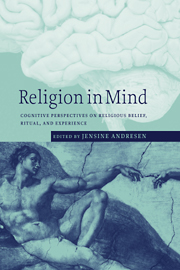Book contents
- Frontmatter
- Contents
- Notes on contributors
- 1 Introduction: towards a cognitive science of religion
- PART I BELIEF ACQUISITION AND THE SPREAD OF RELIGIOUS REPRESENTATIONS
- 2 On what we may believe about beliefs
- 3 Cognition, emotion, and religious experience
- 4 Why gods? A cognitive theory
- PART II QUESTIONING THE “REPRESENTATION” OF RELIGIOUS RITUAL ACTION
- PART III EMBODIED MODELS OF RELIGION
- Index
3 - Cognition, emotion, and religious experience
Published online by Cambridge University Press: 02 December 2009
- Frontmatter
- Contents
- Notes on contributors
- 1 Introduction: towards a cognitive science of religion
- PART I BELIEF ACQUISITION AND THE SPREAD OF RELIGIOUS REPRESENTATIONS
- 2 On what we may believe about beliefs
- 3 Cognition, emotion, and religious experience
- 4 Why gods? A cognitive theory
- PART II QUESTIONING THE “REPRESENTATION” OF RELIGIOUS RITUAL ACTION
- PART III EMBODIED MODELS OF RELIGION
- Index
Summary
“Religious experience” is a term used often, but it is a vague notion that can be approached from differing perspectives. It seems, however, to identify some such aspect of religion which is necessary for a satisfactory theory of religious concepts (McNamara). This aspect is missing in Dan Sperber's (1994, 1996b; Andresen, “Towards a cognitive science of religion”) and Pascal Boyer's theories of the transmission of religious ideas, although these theories otherwise are very useful and to the point. Sperber views religious experience as beliefs that for various reasons have become widespread. In such an approach, it is, by and large, irrelevant whether anyone actually has had a postulated experience, “religious” or not. All that matters is the idea of the experience, and the way it is communicated. Robert Sharf's (1995) studies of a “rhetoric of meditative experience” share the same starting point but without such theoretical basis as Sperber's. Boyer's view, for its part, shall be discussed in more detail below.
The idea that religious experiences are mere beliefs about experience may sound quite odd to scholars who are used to thinking that subjective experience is a particularly important dimension of religion. They are partly, but only partly, right, and thus my own approach is a kind of compromise between these two extremes. I shall start with a few remarks about the background of Sperber's “non-experiential” approach, trying to show that it is one-sided and needs to be complemented by taking into consideration religious belief and emotions. After that I focus on the concept of “religiousness,” and finally try to show how religious belief and “religious experience” can be understood as an emotional attitude towards counterintuitive representations.
- Type
- Chapter
- Information
- Religion in MindCognitive Perspectives on Religious Belief, Ritual, and Experience, pp. 70 - 93Publisher: Cambridge University PressPrint publication year: 2001
- 8
- Cited by



